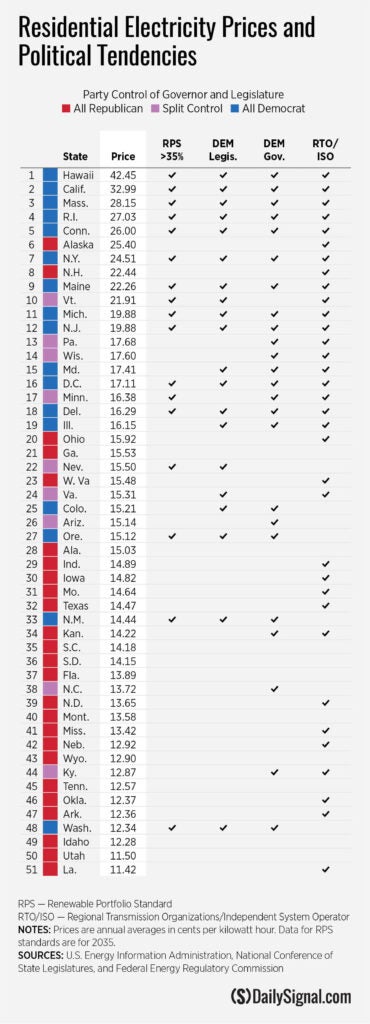Electricity Prices, Driven Up by Mandates, Jeopardize Economic Stability
Mario Loyola / Alexander Frei /
High inflation could soon make a comeback across the American economy. That’s because a combination of soaring demand for electricity and artificially constricted supply has laid the foundations for steadily increasing electricity prices.
Not only do people rely on electricity, but it’s an essential component of all commerce in the economy.
As such, a healthy economy requires a change in direction in energy policy.
The inflation rate measures the average annual percentage increase in the consumer price index. The CPI is an index measuring changes in prices of a typical basket of goods over time. Items in the basket include typical purchases, such as housing, food, energy, insurance, clothing, and appliances. These items are weighted for relative importance, and among the most important is electricity.
Electricity bills are rising because of the required adoption of renewable energy mandates, carbon emission-reduction goals, and cap-and-trade schemes, as can be seen in this table, primarily in states with Democratic leadership.

States that have required renewables, particularly wind and solar energy, to be used in electricity production often experience higher electricity costs due to the regulatory burdens placed on traditional energy sources, such as natural gas and coal.
For instance, several states have limited the construction of natural gas infrastructure or restricted access to abundant natural gas resources, exacerbating energy costs for their residents and their neighbors.
At the same time, incentives for clean energy in the so-called Inflation Reduction Act discourage investment in power plants fired by natural gas or coal that provide affordable and reliable baseload power.
People are all too familiar with rising residential electricity bills and their consequences for inflation rates. It’s obvious that all businesses have to pay for electricity, too. What’s not as obvious is that electricity is a crucial input into the production of virtually everything that is produced, bought, and sold.
The exact weight for electricity in the CPI is 2.43%. That means that if electricity prices were to double, holding every other input constant, electricity prices alone would cause a one-time increase in the inflation rate by about 2.5%.
Added to existing inflation, such an increase would spell hard times for Americans. The latest numbers, for September 2024, show the CPI rose by 2.45% over the prior year. By adding a further 2.5% from a doubling of electricity prices, the overall inflation rate would jump to 5%.
This is a conservative estimate, however, because electricity is a vital component of other goods and services. An increase in electricity prices would also cause price increases of those other goods. When electricity prices rise, it creates a domino effect. Production and transportation costs rise, prices of goods rise, and those price hikes in turn increase the CPI.
The effect of higher electricity prices is particularly important in the manufacturing sector. Manufacturing companies use energy-intensive processes, making them extremely vulnerable to elevated electricity prices. Higher electricity prices mean higher prices for manufactured goods, along with lower competitiveness.
One example of the damage done by higher electricity prices is Germany, where companies are relocating due to higher energy prices caused by the closure of nuclear power plants and the cutoff from Russian natural gas.
In an annual survey of 3,300 German companies, performed annually since 2012, the German Chamber of Commerce and Industry found that 40% of companies were considering relocating or reducing production due to high electricity prices.
According to Association of German Chambers of Commerce and Industry Deputy Managing Director Achim Dercks, “The trust of the German economy in energy policy is severely damaged. So far, the government has failed to provide companies with a perspective for a reliable and affordable energy supply.”
A doubling of electricity prices could produce a rise in inflation well above 5% and drive jobs offshore. This would fall hardest on America’s poor but would affect everyone.
Policymakers need to examine their focus on promotion of renewable energy and consider a change in policy direction.
